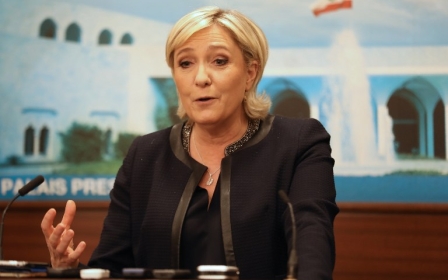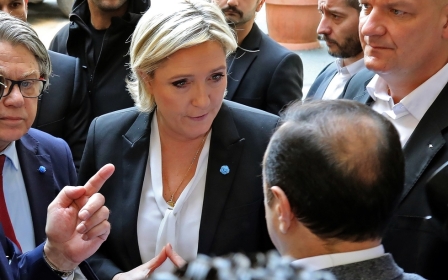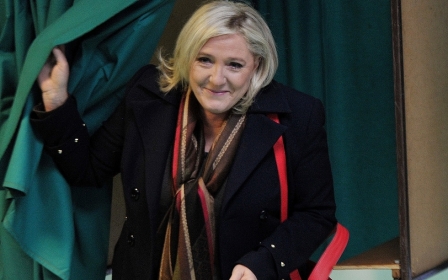Marine Le Pen plays the Lebanon card in French presidential race

BEIRUT - Soon after descending from the plane on Monday, Marine Le Pen, the French extreme right-wing leader and frontrunner in the presidential poll, set off for the antique city of Byblos, 40km north of Beirut. There, in a traditional stone house recently turned into a restaurant, waited Roger Eddé, a rich and powerful businessman.
“By welcoming Marine Le Pen, I am welcoming the president of the largest political party in France,” he explained. “I am doing this out of respect for her voters. She is the face of France,” he added, while cautioning that he does not want to interfere in French politics.
READ: Marine Le Pen refuses to wear headscarf
It is the first time the two have met. But Eddé knew Marine’s father, Jean-Marie Le Pen, who led the National Front from its creation in 1972 until 2011, when he passed power on to his daughter.
“I’ve always admired his verve and his charisma but he was never going to become president," said Eddé.
“She might.”
Forging an international persona
Le Pen, who is running for the French presidency, was visiting Lebanon for two days. As the election approaches, this trip was an occasion to strengthen her position on the international stage while taking advantage of the close bonds her party has forged with Lebanon over the years.
The overseas dimension is one that Le Pen has lacked compared to her presidential rivals, largely because her party advocates isolation and protectionism and has few friends at home or abroad. The latest opinion polls in France put her first in the two-round contest with around a quarter of the votes.
'It is a struggle for freedom and sovereignty which I believe is something that resonates particularly in Lebanon…'
- Marine Le Pen
On arrival in Lebanon, Le Pen was greeted for the first time by a foreign head of state. But she was not the first French presidential hopeful to set foot on Lebanese soil: Christian president Michel Aoun, who took office last October after more than two years of political vacuum, welcomed Emmanuel Macron, the fresh-faced centrist candidate, in January.
Le Pen met with Aoun for 30 minutes, then emerged. “I have explained to President Aoun the true meaning of my political struggle,” Le Pen said. “It is a struggle for freedom and sovereignty which I believe is something that resonates particularly in Lebanon…
“President Aoun concluded our meeting by wishing me luck for the presidential elections and I hope that I’ll have the chance to welcome him in Paris for an official visit after I am elected.”
She also met with Prime Minister Saad Hariri, Minister of Foreign Affairs Geban Bassil and four members of parliament: Alain Aoun, Atef Majdalani, Michel Moussa and Fouad Saad.
The Lebanon link
But this visit did not come about by chance. As Le Pen highlighted herself during the diner in Byblos, the National Front and Lebanon go way back.
“I have heard so much about Lebanon from my family and my father who reminded us always of the great friendship our countries have held for centuries," she said.
“I also heard of the misfortunes of Lebanon, of the difficult moments of its history and the difficult moments we shared. I think there is no stronger bond than the bond of bloodshed and together we have this bond.”
Her hosts clapped and cheered her words.
'I have heard so much about Lebanon from my family and my father who reminded us always of the great friendship our countries have held for centuries…'
- Marine Le Pen
During the Lebanese civil war, which lasted from 1975 until 1990, several National Front supporters joined the ranks of Christian militias. For some in Le Pen’s close circle, this is still a matter of pride.
Thierry Lieger was among them. During the 1980s, he used to dream of “fighting with the French forces in Lebanon” as he puts it. Already back then, he used to identify with the ideology of the Christian militia. Some of his friends joined their ranks.
Today, this tall, bald man literally exists in the shadow of the Le Pens: he was Jean Marie’s bodyguard for 20 years and Marine’s since 2011. In late January, the French newspapers Marianne and Mediapart published a report, saying that he was the beneficiary of a fictitious job as a parliamentary assistant.
READ: Lebanese should question Le Pen carefully
On 20 February, while Le Pen was in Lebanon, police conducted a search at the headquarters of the National Front in Paris. Le Pen has denied all allegations but while in Lebanon she simply said: "I will not discuss French matters when I’m in Lebanon." Lieger, as always, refused to comment on the matter, be it in Lebanon or France.
Le Pen’s entourage also included Wallerand de Saint Just, currently treasurer of the National Front. A former candidate for the Paris City Council, he was also the lawyer of Samir Geagea, a former Christian militia leader who was imprisoned in the aftermath of the civil war. Released after 10 years in prison, he is now leading the Lebanese Forces faction. Le Pen met with him during her visit.
Then there was Omar Harfouch, a 47-year old self-proclaimed billionaire who was born in Tripoli, Lebanon, holds French nationality and sometimes appears on French TV reality shows. Harfouch has interests in the Ukrainian music and modelling industries. He refused to comment on the reasons for his presence during the visit.
A clash with Hariri
The trip also allowed Le Pen to hint at what her policy would be for the Middle East, should she assume power this May.
During her speeches she expressed three main ideas: that France would take no more refugees; that France would stand side by side with the Christian community; and that it would support Syrian President Bashar al-Assad.
But in Beirut, those ideas are not to everybody’s taste. By being so bold in her speech, Le Pen seemed to forget that Lebanon hosts more than a million Syrian refugees, making it the country with the highest density of refugees worldwide.
'The moderates who constitute the overwhelming majority of Muslims in the world are the first target of terrorism. The worst mistake would be the amalgam between Islam and Muslims on the one hand, and terrorism on the other hand'
- Prime Minister Saad Hariri
She also seemed to ignore that at least two-thirds of the population of Lebanon are Muslims. Many, including Prime Minister Saad Hariri - whose father Rafik was allegedly assassinated by the Assad regime in 2005 - support the Syrian opposition.
After meeting with Le Pen, Hariri expressed his concerns.
“The moderates who constitute the overwhelming majority of Muslims in the world are the first target of terrorism,” he said. “The worst mistake would be the amalgam between Islam and Muslims on the one hand, and terrorism on the other hand.
"The Lebanese and Arabs, like the majority of the world, consider France to be the homeland of human rights and of a republican state that makes no ethnic, religious or class distinction between its citizens.”
READ: The BBC and Andrew Marr let Marine Le Pen off easy on Islamophobia
Le Pen rarely admits she is wrong. And while she said there were differences here between herself and some of her hosts, she was not going to start backing down here.
“On a number of points, we have some differences … I expressed my analysis of the Syrian crisis to the prime minister. Today, I see no viable and plausible solution other than a binary choice between Bashar al-Assad and the Islamic State,” she said.
“I clearly stated that in the context of a policy of the lesser evil, which is a realistic policy. It appears to me that Bashar al-Assad is by far today a much more reassuring solution for France than the Islamic State.”
The silence of supporters
In addition to the historical ties with Christian networks, the National Front is also popular among French voters who live in Lebanon.
In the 2012 French president election, Le Pen took almost 9 percent of the votes cast in Lebanon – three percentage points more than her total for the French voting abroad.
On Monday evening, Le Pen met with a hundred or so of her Lebanese supporters during a private meeting at her hotel, giving a speech and answering their questions.
'All I can say is that she is a wonderful woman and I was thrilled to see her. She will make a great president'
- Supporter of Marine Le Pen
Afterwards, almost all her audience refused to speak to the press.
“The party didn’t want journalists to be there so I won’t contradict them,” said one young Lebanese woman who asked to remain anonymous. “All I can say is that she is a wonderful woman and I was thrilled to see her. She will make a great president.”
But there is one issue some of her supporters have yet to reconcile themselves to. Le Pen has proposed prohibiting dual citizenship for non-European countries. In Lebanon, at least two-thirds of French voters fall into this category.
Gilbert Collard, a National Front MP accompanying Le Pen, tries to calm the situation. "I am trying to change this measure a little,” said Collard, whose mother is of Lebanese origins.
“I would like dual citizenship to be allowed in some cases, for example, for those who have done their military service. But so far, it is a very personal idea that is not accepted by Marine.”
Controversy over the veil
No visit to Lebanon is complete without also speaking to a religious figure. On Tuesday Le Pen met with, among others, Cardinal Mar Bechara Boutros al-Rai, the Maronite Patriarch of Antioch. She was also scheduled to meet with, among others, Beirut’s mufti Sheikh Abdellatif Deryan. It didn’t happen.
On arrival Le Pen was offered a shawl to cover her hair but refused and left. Later she told journalists that when she met the rector of the Al Azhar mosque in Egypt in 2015 she was not required to wear the veil; also that her entourage had told the mufti’s team the night before that she would not wear the veil and no objection was made.
“Things must be very clear, I respect the mufti and that is why I wanted to meet with him,” Le Pen said. “But I strictly refuse to wear a veil. I had told him so beforehand and I thought that the fact that he kept our meeting scheduled meant he approved my condition. It wasn’t the case and our meeting didn’t happen.”
Later she added: “For me the veil symbolises the submission of women.”
That wasn't the only controversy: a handful of protesters greeted her at one stop on her itinerary, waving placards.
“We are ashamed that the Lebanese establishment has welcomed her this way” said Farah Kobaissy, one of the protesters. “Fascists like her shouldn’t be given a platform to express racist ideas in Lebanon."
"They are wrong," Le Pen said. "I am not fighting against a religion. I am fighting against a political ideology which is called Islamic fundamentalism."
And with that she departed the hotel for the airport and France.
New MEE newsletter: Jerusalem Dispatch
Sign up to get the latest insights and analysis on Israel-Palestine, alongside Turkey Unpacked and other MEE newsletters
Middle East Eye delivers independent and unrivalled coverage and analysis of the Middle East, North Africa and beyond. To learn more about republishing this content and the associated fees, please fill out this form. More about MEE can be found here.




